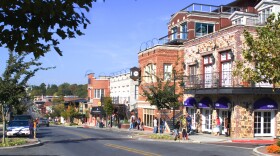More than 13,000 Arkansans identify as transgender, according to a recent report by the Williams Institute at the UCLA School of Law. That's a larger percentage of the population than the national average and puts Arkansas 18th in the nation.
Barriers to healthcare for these Arkansans remain a significant struggle. That’s especially true for those who want sex reassignment surgery, are on hormone therapy, or are seeking mental health services.
Cash Ashley, born Ashley Cash, is a 32-year-old restaurant manager living in Little Rock. Born female, he began to question his gender identity in his early 20s.
"I think I was about 22 when I was dating someone at the time, and I was like, “Hey, so I would actually like to be called he," says Cash.
"So that is where it kind of started and that was sort of the language that I used to start it with. Or, I think I maybe even started with, 'I don’t want to be called she.' You know, like maybe just a lack of pronouns and that lead to being preferred to be called 'he'. And then very soon after that I was like, “Okay, I am a trans person,” says Cash.

Since then, Cash began hormone therapy and is considering having a mastectomy to have his breasts removed, but he isn’t sure when or where he wants to get this procedure done.
He says that due to a lack of medical knowledge and experience, sexual reassignment surgery and even basic healthcare for trans people in Arkansas often comes with obstacles that aren’t always easy to overcome.
"Doctors are becoming more aware of this population that needs access to care and it’s hard to go into a physicians office, especially if they don't know anything about it, or if you don’t know if they know anything about it and be like, “Hey, I’m trans” because some doctors just don’t know about that. Or they have never had experience with it before. Or they think it's a malady. Or a mental disorder versus something that just exists," says Cash.
Even when healthcare is available, doctor visits can lead to uncomfortable situations, especially with physicians he doesn’t know.
"It's hard to go into the ER for something, especially if... you look like male, but you know that you are female-bodied. Sometimes it's anxiety-producing to have to say that to them. And, I think that sometimes people will choose not to go and then that can negatively affect their health. Or they’ll have a bad experience. Or it could just even be an uncomfortable experience that turns you off and makes you not want to go back," explains Cash.

Some people opt for out-of-state surgeries, only to come back to Arkansas where follow-up care for post-operative complications can be difficult.
"You go in with almost anything, any sort of sickness, and at this point, it’s been seen before. We know how to treat it. You go in with the flu, they know what to do. You go in with strep, they know what to do. But if you have recently had bottom surgery and can’t urinate and go in, they don’t know what to do about that,” says Cash.
He says he’s noticed an increase in healthcare options for trans people in Arkansas over the past few years and points to the opening of a gender clinic at the University of Arkansas for Medical Sciences, saying that he thinks it’s had a real impact.
"There’s more and more of that happening and its getting bigger and bigger. Literally, like, in the last six years, I feel like it's exploded. It's nothing compared to biggest cities, but as far as what we used to have, which was literally nothing, at least there’s something," says Cash.
Arkansas is the place he loves and calls home. He says he plans to continue to stay in-state.

"If you can get through those times when you’re younger, you can become an adult who's helping to make it better for the next kids coming through. That's just the only way I know of. That's a lot of the reason I've stayed in Little Rock. I don’t have as much time as I would like to devote to queer activism but in my own ways I feel like I am able to reach out to and help that community," says Cash.
Today, Cash takes pride in not fitting the heteronormative mold and says he hopes that he can make other LGBTQ Arkansans feel the same.
"I feel privileged to be able to identify, first and foremost, as being queer. For me, that’s a privilege that I am really thankful for because every year, more and more, I think people embrace just being whoever you want to be and not worrying whether or not it's weird. I'm a queer, tattooed person who doesn’t work a nine-to-five. But I don't think being another way would make me happy. Just like I support anyone being not tattooed and straight and working a nine-to-five. Do whatever makes you happy," said Cash.






